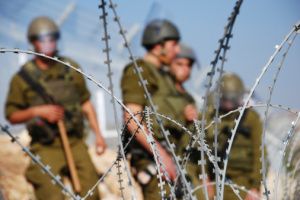With the sharp deterioration of the situation in Sinai (especially in its northern part), which occurred in Egypt after the overthrow of the regime of the “Muslim Brotherhood”, the issue of control (or rather, the lack of control) in the Sinai Peninsula has been renewed in the world media.
So much so, that the leaders of the Bedouin tribes that live in Sinai issued a statement of intent to create their own security forces in the peninsula until the formation of the “Bedouin army”.
However, the big question is whether the “militias” will give way to positive action. After all, even in the “best of times”, the Israeli-Egyptian border was a serious problem for both states. It should be noted that despite constant talk about the effectiveness of border control, in the “Mubarak” period socio-economic problems still prevailed on the Egyptian-Israeli border. The Israeli-Egyptian border back then turned into a source of the illegal migration of African residents into Israel, and has become a real “headache” for both Israel and Egypt.
Israel has repeatedly expressed outrage at the “inaction” of Egypt against the penetration of illegal immigrants into its territory, as well as the smuggling of goods and drugs.
In turn, the Egyptian authorities have regularly pointed to the groundlessness of such claims. Moreover, Cairo laid a good deal of responsibility for the unfavorable situation on the Israeli side of the border, focusing on the fact that the interest of cheap labor in Israel is one of the “key” factors for the influx of illegal migrants through the outposts. As proof, the Egyptians refer to the Israeli media, which, in particular, at the end of August 2009, reported that a network for the delivery of illegal immigrants from Africa was uncovered in Israel. The central office of the organization is in Lod.
However, after the “Tahrir Revolution”, the emphasis dramatically shifted to the politicization of the Sinai Peninsula, for which there seems to be good reason.
In particular, after the attacks on Eilat, the terrorist attacks last August in southern Israel that killed eight people, and attacks on police and other public facilities in Al-Arish, the regional media paid even more attention to the activities of Islamist organizations in the territory of the peninsula.
The first is the Palestinian organization called “Popular Resistance Committees”, founded in the fall of 2000 by figures of the well-known Abu Samhadana clan, who are centered in the Gaza Strip and control, as is commonly believed, the smuggling of arms and goods from Egypt into Gaza.
In addition, reports are made on the deployment of a flurry of activity on the peninsula by veterans of military conflicts in Afghanistan, the Caucasus and the Balkans (for example, one of the coordinators of the Caucasian militants, Egyptian Abu-Rabia), as well as the creation of large training camps for militants in Al-Arish in North Sinai.
Thus, both Israel and Egypt become victims of the Camp David Accords they signed back in 1979. As is known, in accordance with the provisions of the 1979 Peace Treaty, after the withdrawal of IDF troops from the peninsula on Egyptian territory in 1982, three zones were created: “A”, “B” and “C”, and in Israel “D”, within which the number of troops, weapons and military equipment was restricted.
Without going into too much detail, we can say that in zone “B”, which covers almost the entire peninsula (50 km east of the Suez Canal and 20 km west of the state border of Egypt with Israel and the Gaza Strip), Egypt is allowed to have just four battalions (of up to 4 thousand people) and they can only be equipped with light weaponry.
Area “C” (20 km of the Egyptian border zone) is, according to the Treaty, only for the Egyptian police and the deployment of international forces (under the agreement this involves the placing of a contingency of UN troops).
Moreover, they above-mentioned areas constitute a zone, where Egyptian combat and reconnaissance aircraft are restricted, as well as naval ships and early warning systems, and Egyptian border guards are not allowed to carry armed helicopters.
It is therefore not surprising that in the late 80s and early 90s Sinai became a haven for radical Islamists of every persuasion, who in recent years have been growing bolder and have been sharply increasing their activities taking advantage of the confusion of post-revolutionary Egypt.
Generally speaking, there is currently a stalemate in the peninsula.
On the one hand, in the face of increasing Islamist activity on its southern borders, Israel must agree to review the provisions of the Camp David Accords, and allow a sufficient number of Egyptian forces to enter the territory of the Sinai Peninsula in order to monitor the situation.
On the other hand, most of those Egyptian forces are dominated, to put it mildly, by those who don’t carry pro-Israel sentiments.
So far, it seems, Israel is still counting on the U.S. (and indeed Western) financial “leverage” in relation to Cairo (after all, $1.5 billion will be welcome for the Egyptian army under any government), as well as tactical concessions (like, say, the recent agreement on the deployment of two Egyptian infantry battalions in Rafah and Al-Arish).
However, after all, sooner or later, a decision will have to be made between having one of the most powerful – and significantly Islamized – armies in the region, stationed directly on the Israeli border, or dealing with regular shelling by Islamists not only in the territory adjacent to the Gaza Strip, but also Israel’s entire southern region.
Vitaly Bilan – Candidate of Historical Sciences, expert on the Middle East, exclusively for New Eastern Outlook.
